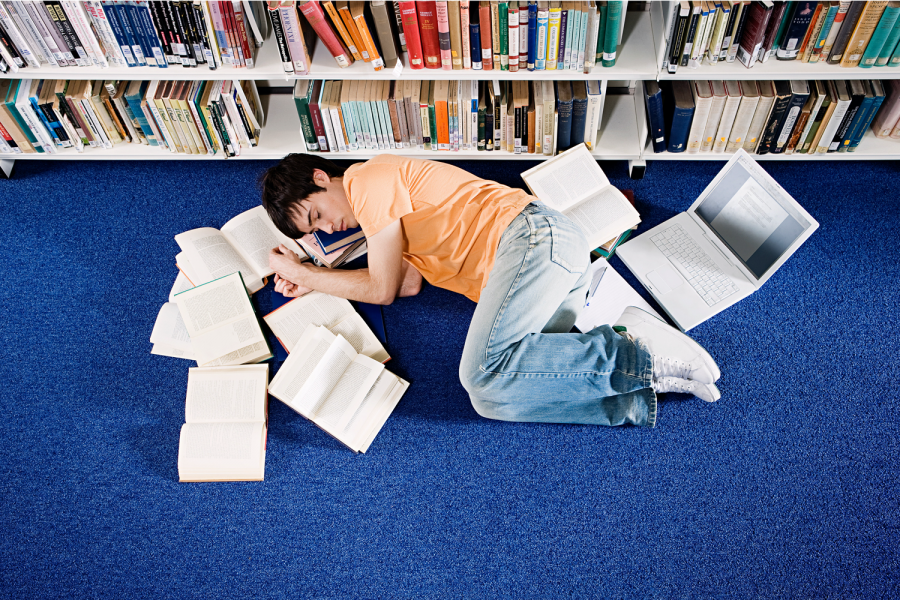Curing student mental burnouts: self care beyond facemasks
A student taking a nap to exercise self care and deal with the stress of school work.
Imagine early November in a pre-pandemic world: the sweet, pumpkin-spice period between Halloween and Thanksgiving. Neighborhoods reluctantly take down their spooky decorations as the leaves lose their last traces of green. The local cinema is still playing the final weeks of horror movies, and the mall is packed with shoppers prepared for Black Friday sales. Families call each other to make Thanksgiving plans, and social media is flooded with the last few Halloween costumes and the first fall fashion fits.
Early November in 2020 would have been unimaginable to all a year ago. As students stress keeping track of classwork over Zoom, the holidays may be the last thing on their mind. Cinema and store windows are covered with bankruptcy-induced final sale tags, and many families cancel plans due to the high risk of large gatherings.
With the intense, high-stakes election, the anxiety of keeping up with webinar times, lack of communication with professors, the seemingly constant stream of assignments and the struggle to bring up or maintain grades in the last leg of the semester, students in the pandemic era are often overwhelmed with an intense amount of stress, but have very limited ways to safely go out and relieve it. Throughout the year, many students have reported feeling mental drained, exhausted or overwhelmed.
Lucy Kim, a sophomore at the University of Texas, is one of these students.
“Even if I am having a day off at school, it feels so stressful because there’s always something coming up that I need to prepare for,” Kim said, referring to the busy schedule often accompanied by online school.
Kim is definitely not alone in feeling this exhaustion and stress. Even in a pre-pandemic world, HealthCareers.com states that 63.4% of American college students reported feeling overwhelming anxiety and stress due to school. The dangers behind stress are not simple, short-term effects. In fact, great amounts of stress could affect the body and mind in unimaginable ways.
Guilford College Professor of Psychology Dr. Eva McGuire is well aware of these physical consequences both as a college professor and a psychology expert.
“There is a long-standing and well-documented connection between stress and behavior, including physical effects,” McGuire stated, although she admitted that certain degrees of stress could be motivating or challenging to encourage growth.
According to WebMD, these physical effects could be serious, including insomnia, low energy, headaches, upset stomach, chest pain, aches and a weakened immune system—an especially serious consequence during a pandemic. In order to prevent or reduce these disastrous outcomes, what is the best plan of action?
Dr. McGuire recommends not only good studying habits, but also personalized self-care to reduce stress.
“There are tons of stress reduction techniques out there, including meditation and yoga,” she shared. “It is important to find something that fits with the individual.”
With all the posts on social media sharing self-care methods, it may be difficult to find the most effective stress management technique for oneself. Numerous high school and college students were asked to name their method of relieving stress during the pandemic.
Trisha Santanam, a junior at the Early College at Guilford, cites the source of her stress as not only a product of her schoolwork, but also as a sum of extracurricular activities and unique personality traits.
“I usually just get whatever I have to get done so I can then move on to other things,” Santanam said.
Whenever she isn’t utilizing this method, she opts for one of two methods: “The first is obviously doing activities that will immediately provide relief such as taking naps or relaxing by going on a walk or just watching TV. The second is more of thinking of where you’ll be in a week—you can think about what good things will happen, or the deadline that has passed.”
Adun Akinola, a senior at the Early College at Forsyth, attributes her stress to her responsibilities as a child, sibling, friend and many other roles she undertakes.
“I take a lot of naps,” she said. “Really feeling the moment helps me slow down and unwind, as does caring for my health.”
Other than napping, she picks up relaxing hobbies such as crocheting, reading or playing instruments just for fun.
Naps are not a mental rest method to be overlooked. A 2015 from Université Paris Descartes-Sorbonne Paris Cité in France stated that a 30-minute nap could help regulate hormones associated with stress and the immune system. By taking a nap, both the mind and the body can reset, helping one to prepare for any upcoming webinars or stressful exams.
Hobbies, such as Akinola’s crocheting and reading, are also a popular way to relieve stress. Lan Truong, an alum of the Early College at Guilford, not only recommends smart studying habits, such as using a planner to spread assignments out, but also picking up physical activities or pastimes.
“(I) take a short nap every day, exercise a little (like dance),” she said, paying tribute to her hobby of dancing covers to popular K-Pop songs. Physical hobbies such as dance could double as both stress relief and exercise.
Of course, hobbies do not always have to be physical. Abby Sutherby, a high school student at High Point Central and the owner of a social media account dedicated to providing tips about self-care, emphasized the importance of picking up pastimes that bring one joy.
“I think a good way to relieve stress is to do things that you love,” she said.
In a world caught in an unforeseen disaster, it is easy to get caught in the turmoil of COVID-19 updates and webinars that always seem to be scheduled at the wrong times. However, it is crucial to not only spend time on reaching goals for the future, but also to set aside time for mental rest in the method of personal choice. By resting the body and mind either physically or through activity, de-stressing is a crucial part of staying afloat during a time where it is quite easy to feel drowned in both negativity and responsibilities.










